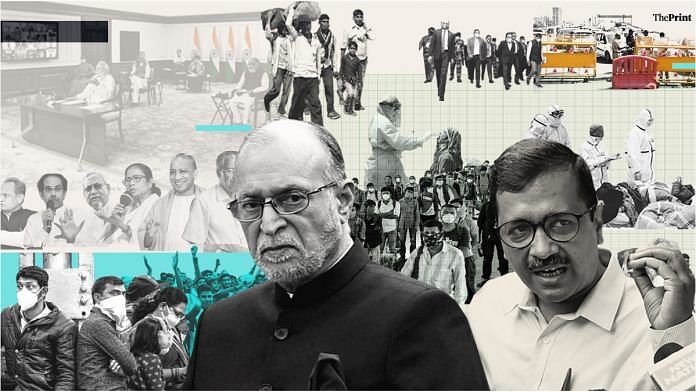The WHO recently said that Covid transmission by asymptomatic patients is “rare”, casting doubts on whether such cases are a major threat to containment efforts of the disease. Delhi Lieutenant Governor Anil Baijal directed the state government Monday to test asymptomatic direct and high-risk contacts of confirmed Covid cases, contrary to the AAP government’s earlier testing policy that ruled out asymptomatic cases.
ThePrint asks: Is it politics that is dictating India’s testing policy or medical science?
Any policy which limits testing now could be motivated by politics
 Dr. Ashok Seth
Dr. Ashok Seth
Chairman, Fortis Escorts Heart Institute
Any policy which limits testing now could be motivated by politics while any policy which increases testing is largely dictated by science.
Till now, India’s proactive strategies of fighting against Covid-19 have been appreciated by most medical experts, except the low testing rates. The testing strategies defined by ICMR have been targeted and guided by feasibility availability, logistics, and financial and societal implications of widespread testing. And as the above limitations improved overtime, the indications of testing were expanded. Till now ICMR has been guided by common sense because if India was to follow the Korean rates of testing, we would need more than 5 crore tests, which is an impossible proposition.
However, most experts would agree that now it is imperative that India escalates the testing rapidly to asymptomatic populations who can be potential superspreaders, which include direct high-risk contacts of Covid patients, healthcare workers, hospitalised patients undergoing procedures etc. India should also increase community-level testing, otherwise we risk losing the battle. The effort should be to diagnose, isolate, treat and protect more.
Scientific criteria are dictating testing policies and not politics
 Giridhar R. Babu
Giridhar R. Babu
Professor and Head Lifecourse Epidemiology, Public Health Foundation of India
The confusion on the Covid testing policy is precipitated by the knowledge gap — whether asymptomatic patients spread the infection or not. The ICMR allows testing only one type of asymptomatic: close contacts of primary symptomatic patients. WHO also announced that it is very “rare” for asymptomatics to spread coronavirus.
The asymptomatic group comprises pre-symptomatic, who will develop symptoms at some point, atypical symptomatic who have symptoms yet to be recognised, like loss of taste or smell, and then the truly asymptomatic that will never show symptoms.
In science circles, the question is now – why do they remain asymptomatic? Cross-reactivity to other types of coronaviruses, genetics and blood groups are offered as explanations. These persons possibly show a better immune response, but how many spread the infection is not clearly known. So, why test them at all? Anyone who says they should be tested will have to give evidence that asymptomatic persons with different viral loads also have high viral shedding. From a layperson person’s perspective, we have been saying that you need to avoid MEN (secretions from Mouth/Eye/Nose). If someone is not having symptoms (cough, sneeze), how can they spread?
Testing cannot replace these public health actions. Better to treat every person as having Covid; wear masks and follow physical distancing. It’s scientific criteria dictating testing policies, and it is political to say that it’s political.
Politics around Covid testing unfortunate. Important to identify pre-symptomatic cases
 Indranil Mukhopadhyay
Indranil Mukhopadhyay
Associate Professor, Jindal School of Government and Public Policy and member, Jan Swasthya Abhiyan
Whether a state government is doing adequate Covid tests has become a political issue unfortunately. The appropriate indicator to judge would be tests conducted per positive case, which gives an indication of the efforts taken to identify positive cases. Indian states are doing too few tests per positive person. Tests per positive case in many countries is higher than in India (22): Vietnam (780), South Korea (74), Thailand (124). Among Indian states, Andhra Pradesh (109), Karnataka (101) and Kerala (70) have done much more than states like Maharashtra (7), Delhi (12.4), Gujarat (13).
What should be the strategy to test more? Shall we also test asymptomatic contacts of positive cases? According to the WHO, the likelihood of transmission from asymptomatic people to secondary contacts is very low. Studies in Germany show that transmission is more likely to occur during the stages of symptom. It is important to identify pre-symptomatic cases early and test them. We need extensive contact tracing and quarantine. The attempt to use peoples’ fear and get them tested and charge high fees by the private sector is highly condemnable. It is important to curb such tendencies as we need to use resource judiciously now.
Govts can be scrutinised for their testing policy, but scientific knowledge must also be considered
 Srinath Reddy
Srinath Reddy
President, Public Health Foundation of India
Covid tests broadly lie under two categories: tests to detect virus presence in the human body and tests for the antibodies generated in defence. So far, the former has been employed in India to test individuals.
Testing for the virus is directed to: persons with symptoms of Covid-19 or a more generic influenza like illness; persons with a high index of suspicion of frequent viral exposure, like family members, close contacts and healthcare workers and travellers. Hospitalised patients undergoing surgical procedures for other conditions may also be tested. The list of eligible persons has been expanded progressively, based on availability of testing kits, labs and PPE. Initial shortages in all three areas have been mostly overcome by now.
There is often a demand for testing asymptomatic persons, other than those listed above. This is not rational, as the RT-PCR becomes positive usually in the symptomatic or late pre-symptomatic phase. Early tests will be false negative. Since a person testing negative today can acquire the virus a few days later, it is no guarantee of continued non-infectivity.
Scientific knowledge suggests that RT-PCR can continue to be positive even when dead viruses are non-infective. Hence, repeat tests in clinically recovered patients have been given up. Lastly, there is no correlation whatsoever between tests per million population and deaths per million, in any geographic region of the world, as testing is only one of several instruments for containment. Even treatments for Covid-19 will be directed at symptomatic patients who are already test eligible.
Whether governments or labs are following the rules set from time to time can be scrutinised. Rules themselves may change periodically as science evolves. However, judging either of them involves understanding of science as it evolves, especially the technical intricacies that underlie the type, timing and targets of testing.
Also read: Lancet HCQ study row: Did WHO, experts rush to damn the drug due to Trump, Modi politics?
By Pia Krishnankutty, journalist at ThePrint




Indian Council of Medical Research (ICMR) permitted RT-PCR test for Covid-19 on a very narrowly defined segment of population. Test eligibility has been gradually expanded. It remains liberally available to policy makers irrespective of eligibility. But front line personnel, including health care personnel, have to meet eligibility criteria to avail it.
Non-compliance to ICMR’s testing protocol is dealt by revoking license & initiating criminal proceedings, such as filing of FIR etc. So, Indian test data is simply not comparable to countries offering test to their general population.
In early stages, restrictions on test eligibility, was ostensibly, due to limited testing capacity. That testing capacity got ramped up many times in couple of months, which is creditable. Recently, it is claimed that only half of testing capacity is utilized. But waiting time for test result after sample has been taken varies from 1.5-10 days. This sounds contradictory. ICMR could start sharing this information on a regular basis.
Standardization of any test or treatment protocol is a long drawn and tedious process. Fidelity of scientists issuing bureaucratic edicts is rarely to science. It remains to be seen whether relevant associations (of Virologists, Microbiologists, Emergency Physicians, Intensive Care Physicians) and watchdogs (such National Accreditation Board for Laboratories – NABL, National Accreditation Board for Hospitals – NABH, etc.) have the gumption to defend science.
Medical investigations exist to assist clinicians, not to dictate them.
So, the very idea that Indian policy on testing can be science guided is nothing but fairy tale.
An ostrich like refusal to face up to facts. How will Delhi reach 5.5 lac cases by the end of July without community transmission ? Not testing on the required scale has been one of our greatest failures in dealing with the pandemic.